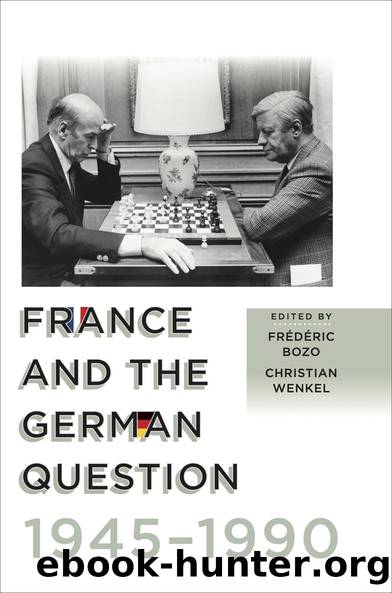France and the German Question, 1945â1990 by Frédéric Bozo Christian Wenkel

Author:Frédéric Bozo, Christian Wenkel [Frédéric Bozo, Christian Wenkel]
Language: eng
Format: epub
ISBN: 9781789202267
Barnesnoble:
Publisher: Berghahn Books, Incorporated
Published: 2019-07-12T00:00:00+00:00
Channeling the Ostpolitik
From 1964 onward one of the objectives of de Gaulleâs policy of détente was to make France the major Western interlocutor of the Soviets. In his view, the Soviet retreat during the 1962 Cuban Missile Crisis had proved that the Soviet Union was no longer a pressing threat and that the time had come for Paris to engage in a rapprochement with the Eastern countries for the sake of overcoming the bipolar order.10 For de Gaulle, this was all the more urgent because, after the partial failure of the 1963 Elysée Treaty on Franco-German cooperation, Chancellor Ludwig Erhard, who had succeeded Konrad Adenauer in October 1963, wanted to give priority to the U.S.-German partnership. De Gaulle believed that a collusion between Bonn and Washington could only strengthen bipolarity and contradict his conceptâexpressed eloquently during his press conference of 4 February 1965âaccording to which European and especially German political and territorial issues had to be settled by the Europeans themselves.11 The coming to power of the Grand Coalition government in West Germany in December 1966 allowed de Gaulle to conciliate entente with Bonn and détente with Moscow, the latter being, in the Gaullist logic of détente, entente, coopération, the first stage of the rapprochement with a country of the socialist bloc. When Brandt, the new minister of foreign affairs, informed the Elysée that he wanted to improve German-Soviet relations (evoking a non-use of force agreement, Germanyâs recognition of the Oder-Neisse border, nullification of the Munich agreements, renunciation of nuclear arms, and improvement of inter-German relations12), de Gaulle supported Brandtâs effort and sought to act as an intermediary between West Germany and the Soviet Union.
By 1967, however, disillusion prevailed: the Poles and the East Germans had managed to convince their allies that relations between the socialist countries and the FRG could not be improved as long as Bonn did not fully recognize the Oder-Neisse line and the German Democratic Republic (GDR, or East Germany); in addition, the principle of non-use of force had to be multilateralized.13 Simultaneously, Chancellor Kurt-Georg Kiesinger slowed Brandtâs attempts to establish a constructive dialogue with Moscow and demanded that the Soviets make the first move.14 Although he was disappointed, de Gaulle continued his policy of détente toward the East, but he refused to embrace both the West German and the Soviet conceptions of European security, the former because it was based on attaining reunification first (although the West German governmentâs declaration of December 1966 seemed to nuance this)15 and the latter because it involved acknowledging the European status quo. De Gaulle was convinced that his conception remained the best option: it was necessary to lay the foundations of a genuine European rapprochement in order to promote, in the long term, the reunification of the whole continent, including Germany.16 The suppression of the Prague Spring by Warsaw Pact troops in August 1968 reinforced de Gaulleâs opinion: according to him, West German activism in Czechoslovakia during the previous months had been seen in Moscow as an expression of the German propensity to challenge existing borders.
Download
This site does not store any files on its server. We only index and link to content provided by other sites. Please contact the content providers to delete copyright contents if any and email us, we'll remove relevant links or contents immediately.
Room 212 by Kate Stewart(5105)
The Crown by Robert Lacey(4806)
Endurance: Shackleton's Incredible Voyage by Alfred Lansing(4769)
The Iron Duke by The Iron Duke(4349)
The Rape of Nanking by Iris Chang(4203)
Joan of Arc by Mary Gordon(4100)
Killing England by Bill O'Reilly(3995)
Say Nothing by Patrick Radden Keefe(3975)
I'll Give You the Sun by Jandy Nelson(3428)
Shadow of Night by Deborah Harkness(3359)
Hitler's Monsters by Eric Kurlander(3328)
Mary, Queen of Scots, and the Murder of Lord Darnley by Alison Weir(3200)
Blood and Sand by Alex Von Tunzelmann(3194)
Eleanor & Park by Rainbow Rowell(3151)
Darkest Hour by Anthony McCarten(3119)
Margaret Thatcher: The Autobiography by Thatcher Margaret(3079)
Book of Life by Deborah Harkness(2931)
Red Famine: Stalin's War on Ukraine by Anne Applebaum(2928)
The One Memory of Flora Banks by Emily Barr(2857)
